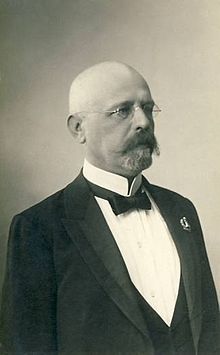Jaan Poska
This article includes a list of general references, but it lacks sufficient corresponding inline citations. (January 2022) |
Jaan Poska | |
|---|---|
 | |
| Minister of Foreign Affairs | |
| In office 24 February 1918 – 20 September 1919 | |
| Preceded by | Position established |
| Succeeded by | Ants Piip |
| Mayor of Tallinn | |
| In office 1913–1917 | |
| Preceded by | Voldemar Lender |
| Succeeded by | Gavriil Beljagin |
| Personal details | |
| Born | 24 January 1866 Laiusevälja, Kreis Dorpat, Governorate of Livonia |
| Died | 7 March 1920 (aged 54) Tallinn, Estonia |
| Alma mater | University of Tartu |
Jaan Poska VR III/1 (Estonian pronunciation: [ˈjɑːn ˈposkɑ]; 24 January [O.S. 12 January] 1866, Laiusevälja, Kreis Dorpat, Governorate of Livonia – 7 March 1920, Tallinn, Estonia) was an Estonian barrister and politician.
Early life[edit]

Poska was born the fifth of 12 children of a Russian Orthodox parish schoolmaster and received his secondary education at the Orthodox church's school in Riga. He entered medical school at the University of Tartu, but soon transferred to law where he graduated in 1890.[1] Poska was the first ethnic Estonian admitted to the bar in Tallinn, where he worked as barrister.
Career[edit]

Jaan Poska was mayor of Tallinn during 1913–1917. In that position he supported reforms, like reforming healthcare and founding two schools. In April 1917, he became governor of the Autonomous Governorate of Estonia. 28 November [O.S. 15 November] 1917 the Maapäev refused to recognize the new Bolshevik rule and proclaimed itself the supreme legal authority of Estonia. The Republic of Estonia formally declared independence on 24 February 1918, only to be occupied by the German Empire until the end of World War I. Estonian war of independence against Baltic German and Russian forces lasted from 1918 to 1920.
On 24 February 1918, Poska was appointed the Minister of Foreign Affairs of Estonia. He worked in Western Europe for gaining diplomatic recognition to Estonia and participated in Paris Peace Conference. He led the peace talks with Soviet Russia and achieved Treaty of Tartu which was signed on 2 February 1920, and helped draft the first Estonian constitution.[2]
When Poska died suddenly on 7 March 1920 at the early age of 54, 20,000 Estonians attended his funeral.[2]
Personal life[edit]
Jaan Poska's daughter Vera Poska-Grünthal was a leading Estonian feminist and lawyer who was married to politician and lawyer Timotheus Grünthal. American lawyer Sharon L. Gleason is Jaan Poska's great granddaughter.[3]
See also[edit]
Citations[edit]
- ^ Miljan 2004, p. 383.
- ^ a b Miljan 2004, p. 385.
- ^ "Vera Grünthal Gleason obituary". Legacy.com. Retrieved 30 July 2023.
- Ülo Kaevats et al. 2000. Eesti Entsüklopeedia 14. Tallinn: Eesti Entsüklopeediakirjastus, ISBN 9985-70-064-3
Cited sources[edit]
- Miljan, Toivo (2004). Historical Dictionary of Estonia. Maryland, USA: Scarecrow Press. ISBN 0-8108-4904-6.
External links[edit]
 Media related to Jaan Poska at Wikimedia Commons
Media related to Jaan Poska at Wikimedia Commons- Tartu rahu sepistaja Jaan Poska väärib monumenti (Estonian)
- Livland. Estland. Kurland. Œsel.
- On 28 November 1917, the Estonian Diet (the Maapäev) declared itself fee supreme power in Estonia.
- On 28 November 1917, the Land council proclaimed itself the highest power in Estonia...
- On This Day - 28 November 1917
- Though the popularly elected Provisional National Council, had proclaimed itself the highest authority in Estonia as early as 28 November 1917...
- 1866 births
- 1920 deaths
- People from Jõgeva Parish
- People from Kreis Dorpat
- Eastern Orthodox Christians from Estonia
- Estonian People's Party politicians
- Ministers of Foreign Affairs of Estonia
- Russian Constituent Assembly members
- Members of the Estonian Constituent Assembly
- Mayors of Tallinn
- Estonian diplomats
- Estonian anti-communists
- 19th-century Estonian lawyers
- University of Tartu alumni
- 20th-century Estonian politicians
- 20th-century Estonian lawyers
- Politicians from the Russian Empire
